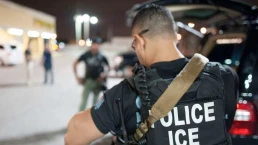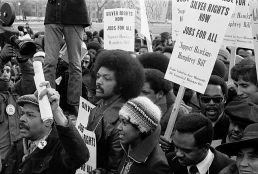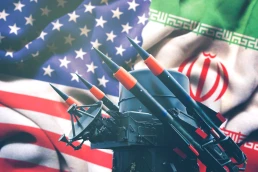Military veterans and their families should not be deported. But neither should other immigrants. Let’s reject a politics of “deservingness” and protect everyone.
By Sofya Aptekar, In These Times
One Purple Heart veteran is in deportation proceedings. Another has self-deported in anticipation of being detained. The father of three Marines is beaten and arrested by Immigration and Customs Enforcement (ICE) agents at work. The wife of a Marine languishes in a Louisiana immigration detention center, apprehended at her green card interview.
Amid a brutal escalation of immigrant deportations in 2025, a spate of news stories including those above highlights a convergence of the U.S. military and immigration system. Immigrants have always served in the U.S. military, and their veteran status does not protect them from being deported alongside their civilian immigrant neighbors. The Trump administration has removed what limited protections had been in place to pause the deportation of their immigrant family members.
These stories can provoke outrage that people who are seen as sacrificing for the United States through military service can be treated in this way. Deported veterans and their family members serve as striking symbols of overreach and illustrate the harsh nature of Trump’s war on immigrants. Such outrage is warranted, but we must pause to consider the connections between military labor and being seen as deserving of protection from ICE.

When ICE agents tear a mother from a nursing infant or an elderly father is beaten by ICE agents on the lawn he is landscaping, should it be their relationship to a U.S. servicemember that gives rise to our outrage? When criminalized people of color, struggling with trauma and mental health, are deported, what does it mean that their veteran status ups the shock of the deportation? Immigrants without connections to the U.S. military contribute labor and care to families and communities — their deportations call for as much outrage, shock and fight back.
Amid the onslaught of dehumanization meted out to immigrants in 2025, it is understandable to look for proof that immigrants do not deserve such treatment. Liberals have long used military service as such proof, celebrating immigrants who volunteer for the military before they even become U.S. citizens. When I started my graduate studies over 20 years ago, one of my professors posted a list of immigrant soldiers killed in the invasion of Iraq as a gesture against President George W. Bush’s anti-immigrant policies. Today, as a scholar of the U.S. military and its immigrant labor force, I watch the latest coverage of military-adjacent deportations pile up, but I reject the temptation to peg deservingness on immigrants’ proximity to the U.S. military.
If veterans and their family members do not deserve deportation, then who are the “bad” immigrants who deserve to be deported? That is the central flaw of deservingness politics: the construction of moral hierarchies that require the belief that someone is deserving of deportation. That way of thinking keeps the systems that brutalize immigrants in place, with the fight narrowed to carveouts for specific groups of “good” immigrants. The turn toward fascism under the Trump administration keeps shrinking these carveouts. Whereas in past years, many pro-immigrant arguments focused on hard work and family, today, these arguments are not enough to defend immigrants’ access to safety and community. Now, apparently, the model immigrants are those who volunteer for the military and their family members.
Recent Posts
Elite Depravity in Imperial Decline, A Zero Hour Conversation With Richard Wolff
February 20, 2026
Take Action Now “The system self-selects for psychopathy… the most sociopathically obsessive competitor and accumulator of personal power and…
Economics of Health For All: The Plan to Put Health at the Heart of the Global Economy
February 20, 2026
Take Action Now At the World Health Assembly in May, member states may endorse an unprecedented strategy declaring that health is not a cost – but…
The Left Owes a Lot to Jesse Jackson
February 19, 2026
Take Action Now As a movement builder, spokesperson, and candidate for the presidency, Jesse Jackson’s accomplishments were massive. He was one of…
Trita Parsi Warns U.S. & Iran Have Incentives to Escalate Conflict
February 19, 2026
Take Action Now “We have a very dangerous situation, because both sides actually believe that a short, intense war may improve their…




